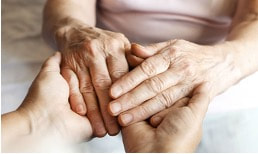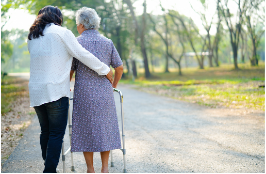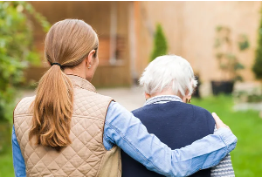|
Hassle Free Allied Health Services Therapy Professionals Ltd Is a private practice of expert health professionals
We save you management and administration time. Since 1985 we have worked in aged care, special education, physical and intellectual disability We have therapists available for short or long-term work. Our staff:
CALL NOW! – we can help you! Therapy Professionals Ltd, PO Box 7807, Christchurch 8240
Phone: (03) 377 5280 Email: [email protected] Website: www.therapyprofessionals.co.nz Equitable Access to Aged Care Under Threat Demand for aged residential care is forecast to increase by an estimated 15,000 beds by 2030  Demand for aged residential care is forecast to increase by an estimated 15,000 beds by 2030, but an unsustainable funding model is threatening equitable access to care for older New Zealanders, according to new research by the NZ Aged Care Association (NZACA). The biennial Aged Residential Care (ARC) Industry Profile 2021-2022* is the most comprehensive report on the state of the industry, a source of credible data and insight used to inform the Association's policy and advocacy work. NZACA Chief Executive Simon Wallace says the report shows trends underpinning the impact of chronic underfunding with an increasing number of providers charging accommodation supplements for additional revenue or by the sale of Occupational Rights Agreements, a license to occupy common in the Retirement Village sector and growing in popularity in ARC. “As a direct result of chronic government underfunding providers are being forced to find additional income streams offering people premium room services, over and above standard rooms. “At the same time, standard subsidy-only rooms are rapidly disappearing as they are unviable for owners trying to operate on needle thin budgets, providing care for an increasingly high needs population of older New Zealanders. “The net effect of this is increasingly inequitable access to care for older New Zealanders.’” As of 30 September 2021, NZACA member care facilities provided 93 per cent of the total 40,941 beds. As a whole, the sector cares for over 35,000 residents – nearly two thirds of whom (57%) are at one of the higher care levels (hospital, dementia, or psychogeriatric) and require highly specialised care by registered nurses (RN’s and caregivers. Health care assistants (ARCC) Mr Wallace says underfunding has also driven a high turnover of RNs over the year at 48 per cent compared to 33 per cent in December 2019, with nurses being actively recruited by District Health Boards offering remuneration that providers are not funded to match.  "The effects of the pay disparity between DHB and aged care nurses are clear in this report. Never before have we seen nurse departures of this scale and with a critically limited pool to recruit from, the sector really is at crisis point.” The sector’s high reliance on a migrant workforce remains high with 43 per cent of nurses on visas, while around one-third of the caregiver workforce is on a visa. Once again, the main countries of origin for the workforce on visas are the Philippines (39 per cent of RNs, 35 per cent of caregivers) and India (37 per cent of RNs and 40 per cent of caregivers). “COVID-19 border exceptions and visa extensions, including the 2021 Resident Visa, have allowed ARC to maintain access, albeit reduced, to the migrant workforce it relies heavily on. While we welcome initiatives to recruit New Zealanders, it is apparent that there is a limited number of Kiwis willing to take these jobs. Working with Government to ensure clear pathways to a career in ARC for both Kiwi and migrant workers is a priority.”  The make-up of the sector has remained stable with 49 per cent of all New Zealand ARC facilities operated as part of a major group of care facilities, 50 per cent individual/minor group facilities and 1 per cent owned by DHBs. The ARC sector is a broad-church, with a wide range of ownership models including religious institutions, charitable trusts, family-owned, not-for-profits, publicly listed, and privately owned facilities and groups of varying sizes. Publicly listed providers operate 34 per cent of the sector’s bed supply. The report also shows that the median number of beds in rest home facilities is continuing to steadily increase and now stands at 60 beds, reflective of the fact that almost all new care homes are being built as part of large-scale retirement village operations. *The Industry Profile 2021-22 for the aged residential care (ARC) sector is provided by NZACA and BERL. It includes information from the detailed NZACA Member Profiling Survey, the TAS Quarterly Bed Surveys as well as publicly available data from the Ministry of Health and the NZ Companies and Charities Registers. Responses to the NZACA Member Profiling Survey covered 77 per cent of the NZACA membership bed supply and 71 per cent of the total ARC bed supply. nzca.org.nz/advocacy-and-policy/are-industry-profile-2021-22 The New Zealand Aged Care Association (NZACA) is a not-for-profit, national membership organisation representing approximately 93 per cent, or more than 37,000 beds, from New Zealand’s aged residential care sector. The services our members provide include rest home, hospital, dementia, and psychogeriatric care, as well as short-term care. Reference; Aged Care New Zealand Issue 02 2022 Electric bikes can boost older people’s mental performance and their well-being Reminding you of your childhood cycle rides and the joy of being young  Getting on your bicycle can give you an enormous sense of freedom and enjoyment. It can increase your independence and knowledge of the local area and improve your access to the natural (or urban) environment. It can also be highly nostalgic – reminding you of your childhood cycle rides and the joy of being young. But beyond the feel-good factor, can cycling actually make any difference in mental abilities and well-being? This was something our new study aimed to investigate specifically looking at cycling among older adults. While most studies incorporate exercise in a gym situation, our study wanted to examine the impact of cycling in the real world – outside a controlled environment. So older adults, aged 50 and above, were asked to cycle for at least an hour and a half each week for an eight-week period. Participants either cycled on a conventional pedal bike, on an electrically assisted ‘e-bike’ or were instructed to maintain their regular non cycling exercise routine as a comparison group. Mental abilities, mental health and well-being were measured before and after the eight-week cycling period. Participants either cycled on a conventional pedal bike, on an electrically assisted ‘e-bike’ or were instructed to maintain their regular non cycling exercise routine as a comparison group. Mental abilities, mental health and well-being were measured before and after the eight-week cycling period. Mental boost Exercise is thought to improve mental functioning through increased blood flow to the brain – as well as an encouraging regrowth of cells, specifically in the hippocampus. This is known to be an area associated with memory. So it was expected that the greater physical exertion required for pedal cycling, compared to cycling an e-bike with a motor would result in greater benefits to mental functioning. One of the tasks we used to measure mental ability is the ‘Stroop test’. The task involves participants being shown the name of a colour printed on a card in a different colour script – imagine the word ‘blue’ printed in red ink. Participants are asked to say the colour of the ink that the word is printed in, rather than reading the name of the colour. The Stroop test measures how accurately someone is able to minimise distraction from the written word when reporting the ink colour. We found that after eight weeks of cycling, both pedal and e-bike cycling groups were better at ignoring the written word, indicating that their mental function had improved. This was not the case for non-cycling control participants. Pedal power Aside from the benefits found to some mental abilities, we also saw a trend for mental health improving for the e-bike cyclists, but pedal cyclists did not change on this measure. This could be because e-bikes may be more enjoyable to ride than normal pedal bikes – helping to improve mental well-being. We also found e-bike cyclists spent more time cycling on average each week than the pedal cyclists. Many of the participants commented that they felt they could go further on the e-bike as they could rely on the motor to get them home if they could not manage it by themselves. This research, to some extent, provides support for many bike-related motivation quotes, including the following from Sir Arthur Conan Doyle: “When the spirits are low, when the day appears dark, when work becomes monotonous, when hope hardly seems worth having, just mount a bicycle and go out for a spin down the road, without thought on anything but the ride you are taking.” It seems then that e-bikes have the potential to re-engage older adults with cycling and provide a great opportunity to increase physical activity and engagement with the outdoor environment. So given that more than three million older people in the UK live alone, of whom more than two million are older than 75, it might just be that the use of an electric bicycle could help to improve older people’s lives by increasing independence and mobility – all of which can have a significant impact on their well-being. Reference; Aged Care New Zealand Issue No 2 2022 Authors; Louise-Ann Leyland Research Associate in the Faculty of Brain Sciences, UCL Ben Spencer Research fellow, Oxford Brookes University Carien van Reekum Professor of Psychology and Neuroscience, University of Reading Tim Jones Reader in Urban Mobility, Oxford Brookes University This article is republished from The Conversation under a Creative Commons license. Read the original article here: the conversation.com/electric-bikes-can-boost-older peoples mental performance and their well-being 11264 If you are wanting to keep your bones strong remember cycling doesn’t put any stress on your bones to keep them strong. It’s important to ensure you have regular variety in the exercise you do. If you need advice on what exercise will be good for you just contact Therapy Professionals Ltd Ph: 03 3775280. Email: [email protected] our friendly physiotherapists can help. |
AuthorShonagh O'Hagan Archives
July 2024
|

 RSS Feed
RSS Feed